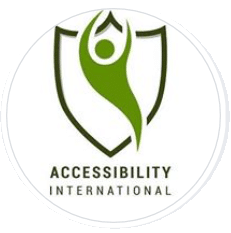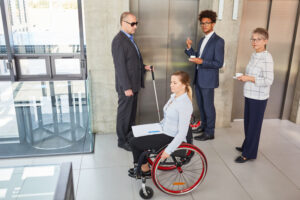October at Microsoft brings falling leaves, steaming cups of pumpkin flavored drinks, the occasional ghostly costume. Most importantly October brings the 75th Anniversary of National Disability Employment Awareness Month (NDEAM) and the chance to reflect on employment for talent with disabilities.
In 1945, American kids tangled the newly invented Slinky and huddled around the radio to listen to the King Cole Trio top the very first Billboard’s chart. Adults cheered on the Detroit Tigers to win the World Series for baseball and were captivated by George Orwell’s Animal Farm.
In the United States over 10 million soldiers were discharged from the military between 1945-47. Although the unemployment rate was at 1.9%, this influx of talent created unrest and uncertainty in the labor market and in the year after WWII, five million workers took to the streets to strike. President Harry Truman recognized the need to support disabled workers which included the nearly 700,000 veterans returning home from WWII with injuries. He declared a week in October 1945 “National Employ the Physically Handicapped Week”, language appropriate at the time. We now know this NDEAM.
75 years later kids are building Minecraft virtual staircases rather than Slinky, and Nat King Cole has made way for Post Malone. But still only 20% of people with disabilities in the US participate in the workforce, compared to 67% participation of those without disabilities. There is much work ahead and business has a huge role to play. That’s why the 2020 NDEAM theme is “Increase Access and Opportunity”.
At Microsoft increasing access and opportunity starts with the talent we hire and develop. By bringing in talent with disabilities we are learning and growing our bar of inclusion with the help of feedback from employees. These insights show up in programs like the Autism Hiring program and Supported Employment and systemic efforts such as accessibility on our campuses and our healthcare benefits.
People with disabilities contribute to the accessibility of our products, services, and websites. Cortana voice assistance and Room Remote on Microsoft Teams Room devices provide access shared meeting room devices with voice commands. Whether you have a mobility disability like me, blind, or have your hand’s full pumpkin lattes, voice commands are a win.
Looking ahead to the next 75 years, I hope to live in a world where disability is universally viewed as a strength and people with disabilities have equitable access and opportunity for employment. To get there we will strive to harness the power of cutting-edge technologies and the innovations of people with abilities to create a more accessible future. We are already seeing a glimpse of built-in accessibility, leveraging inclusive technologies for more accessible working environments. Florida-based Pinecrest Bakery is converting one of their bakeries into a training facility for job seekers with Autism and other disabilities. The bakery uses a combination of Hololens 2, an AR platform called Scope, and a color-coded training program to help bakers-in-training visualize each step in creating a wide range of foods.
You too can contribute to the future of disability employment! Celebrate NDEAM by taking action in a few important areas:
- Hire Talent with Disabilities: Don’t delay, hire someone today! Check out the Microsoft Inclusive Hiring website where we post resources, hot jobs, and employee profiles to attract talent with disabilities.
- Cultivate a Culture of Inclusion: Evaluate how your business is doing in disability inclusion with Disability:IN and AAPD’s Disability Equality Index(DEI). Then ask your employees for feedback. Disability Employee Resource Groups are key partners in your disability employment journey.
- Get accessible: At Microsoft, we measure accessibility like a business. As an individual, you have a role to play as well. Run the Accessibility Checker before sending your next email. It’s easy and inclusive!
- Invent the future of accessibility: AI can help employers eliminate barriers to employment and it can help people with disabilities develop professional skills and influence workplace culture. If you would like to apply for an AI for Accessibility grant, we are calling for applications in the area of Smart Cities and Transportation due on December 15, 2020.
Grab your favorite pumpkin-flavored treat and get to work at creating a more inclusive workplace for everyone. Look forward to recognizing and celebrating the journey of disability inclusion throughout the month of October. Happy NDEAM!




